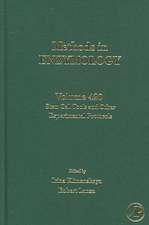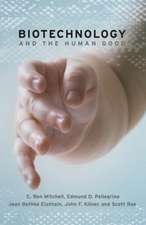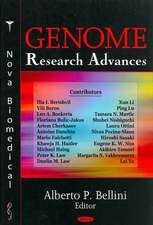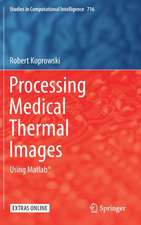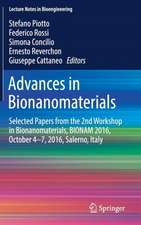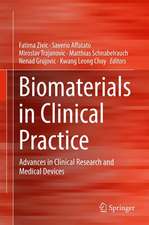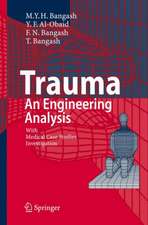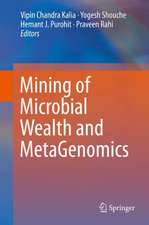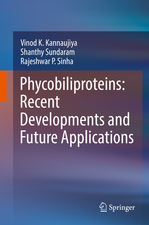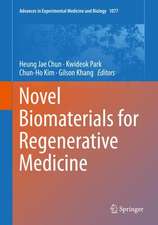Cutting-Edge Enabling Technologies for Regenerative Medicine: Advances in Experimental Medicine and Biology, cartea 1078
Editat de Heung Jae Chun, Chan Hum Park, Il Keun Kwon, Gilson Khangen Limba Engleză Hardback – 7 noi 2018
| Toate formatele și edițiile | Preț | Express |
|---|---|---|
| Paperback (1) | 802.83 lei 38-45 zile | |
| Springer Nature Singapore – 3 ian 2019 | 802.83 lei 38-45 zile | |
| Hardback (1) | 1412.99 lei 3-5 săpt. | |
| Springer Nature Singapore – 7 noi 2018 | 1412.99 lei 3-5 săpt. |
Din seria Advances in Experimental Medicine and Biology
- 9%
 Preț: 719.56 lei
Preț: 719.56 lei - 5%
 Preț: 717.00 lei
Preț: 717.00 lei - 5%
 Preț: 717.00 lei
Preț: 717.00 lei - 15%
 Preț: 640.24 lei
Preț: 640.24 lei - 5%
 Preț: 715.71 lei
Preț: 715.71 lei - 5%
 Preț: 716.28 lei
Preț: 716.28 lei - 20%
 Preț: 691.93 lei
Preț: 691.93 lei - 5%
 Preț: 1031.00 lei
Preț: 1031.00 lei - 5%
 Preț: 820.42 lei
Preț: 820.42 lei - 5%
 Preț: 716.28 lei
Preț: 716.28 lei - 15%
 Preț: 641.38 lei
Preț: 641.38 lei - 5%
 Preț: 717.20 lei
Preț: 717.20 lei - 5%
 Preț: 715.35 lei
Preț: 715.35 lei - 5%
 Preț: 1113.83 lei
Preț: 1113.83 lei - 20%
 Preț: 1161.71 lei
Preț: 1161.71 lei - 5%
 Preț: 1170.51 lei
Preț: 1170.51 lei - 18%
 Preț: 1119.87 lei
Preț: 1119.87 lei - 5%
 Preț: 1288.48 lei
Preț: 1288.48 lei - 5%
 Preț: 1164.67 lei
Preț: 1164.67 lei - 5%
 Preț: 1101.73 lei
Preț: 1101.73 lei - 18%
 Preț: 1123.67 lei
Preț: 1123.67 lei - 5%
 Preț: 1435.64 lei
Preț: 1435.64 lei - 20%
 Preț: 1044.10 lei
Preț: 1044.10 lei - 18%
 Preț: 946.39 lei
Preț: 946.39 lei - 5%
 Preț: 292.57 lei
Preț: 292.57 lei - 18%
 Preț: 957.62 lei
Preț: 957.62 lei - 18%
 Preț: 1235.76 lei
Preț: 1235.76 lei - 5%
 Preț: 1231.55 lei
Preț: 1231.55 lei - 5%
 Preț: 1292.30 lei
Preț: 1292.30 lei - 5%
 Preț: 1102.10 lei
Preț: 1102.10 lei - 18%
 Preț: 1132.81 lei
Preț: 1132.81 lei - 5%
 Preț: 1165.19 lei
Preț: 1165.19 lei - 5%
 Preț: 1418.48 lei
Preț: 1418.48 lei - 5%
 Preț: 1305.63 lei
Preț: 1305.63 lei - 18%
 Preț: 1417.72 lei
Preț: 1417.72 lei - 24%
 Preț: 806.15 lei
Preț: 806.15 lei - 18%
 Preț: 1243.29 lei
Preț: 1243.29 lei - 5%
 Preț: 1429.44 lei
Preț: 1429.44 lei - 5%
 Preț: 1618.70 lei
Preț: 1618.70 lei - 5%
 Preț: 1305.12 lei
Preț: 1305.12 lei - 18%
 Preț: 1124.92 lei
Preț: 1124.92 lei - 5%
 Preț: 1097.54 lei
Preț: 1097.54 lei - 15%
 Preț: 649.87 lei
Preț: 649.87 lei - 5%
 Preț: 1097.54 lei
Preț: 1097.54 lei - 18%
 Preț: 945.79 lei
Preț: 945.79 lei - 5%
 Preț: 1123.13 lei
Preț: 1123.13 lei - 20%
 Preț: 816.43 lei
Preț: 816.43 lei
Preț: 1412.99 lei
Preț vechi: 1723.16 lei
-18% Nou
Puncte Express: 2119
Preț estimativ în valută:
270.37€ • 282.29$ • 223.77£
270.37€ • 282.29$ • 223.77£
Carte disponibilă
Livrare economică 14-28 martie
Preluare comenzi: 021 569.72.76
Specificații
ISBN-13: 9789811309496
ISBN-10: 9811309493
Pagini: 618
Ilustrații: IX, 493 p. 151 illus., 113 illus. in color.
Dimensiuni: 178 x 254 x 25 mm
Greutate: 1.36 kg
Ediția:1st ed. 2018
Editura: Springer Nature Singapore
Colecția Springer
Seria Advances in Experimental Medicine and Biology
Locul publicării:Singapore, Singapore
ISBN-10: 9811309493
Pagini: 618
Ilustrații: IX, 493 p. 151 illus., 113 illus. in color.
Dimensiuni: 178 x 254 x 25 mm
Greutate: 1.36 kg
Ediția:1st ed. 2018
Editura: Springer Nature Singapore
Colecția Springer
Seria Advances in Experimental Medicine and Biology
Locul publicării:Singapore, Singapore
Cuprins
I.3D Printing and 3D Electro-spun for Regenerative Medicine.- 1.3D bioprinting of adipose-derived stem cells for organ manufacturing.- 2.3D printed gelatin scaffold with desired porosity and its biological effects in vitro.- 3.Electrospun 3D scaffolds for tissue regeneration.- 4.Scaffolds fabricated from natural polymers/composites by electrospinning for guided bone tissue-regeneration.- 5.Electrospun and electrosprayed scaffolds for tissue engineering.- II.Intelligent Nanocomposite Biomaterials for Regenerative Medicine.- 6.Graphene-based nanocomposites as promising options for hard tissue regeneration.- 7.Modifications of poly(methyl methacrylate) cement for potential applications in orthopedic surgery.- 8.Intrinsically conductive nanocomposite biomaterials for cellular applications.- 9.Nanobiomaterials for the application for smart contact-lens biosensors.- 10.Polymeric multilayer bioconstructs in tissue engineering and regenerative medicine: A Review.- III.Drug Delivery Systems for Regenerative Medicine.- 11.Evolution of PEG & PEGylation.- 12.Role of cross-linkers in advanced drug delivery and tissue engineering application.- 13.Bone tissue engineering strategies in co-delivery of bone morphogenetic protein-2 and biochemical signaling factors.- 14.Biomaterials-based bioimaging technologies for regenerative medicine.- 15.Growth factors delivery systems for regenerative medicine.- 16.Recent advances in polymer-based nanoparticles for biomedical applications.- 17.Reactive oxygen species responsive polymeric drug.- 18.Nanocarrier-based immunotherapy for Hepatitis vaccination.- IV.Future Enabling Technologies for Regenerative Medicine.- 19.Biomaterials developments for brain tissue engineering.- 20.Conductive polymers in regenerative medicine.- 21.Design of temperature-responsive cell culture surfaces for cell-sheet based regenerative therapy and 3D tissue fabrication.- 22.Harnessing nanotopography of electrospun nanofibrous nerve guide conduits (NGCs) forneural tissue engineering.- 23.Biomechanics in annulus fibrosus regeneration.- 24.Nanopatterned scaffolds for tissue engineering and regenerative medicine.- 25.Process system engineering methodologies applied to tissue development and regenerative medicine.
Notă biografică
Heung Jae Chun, Professor, Institute of Cell & Tissue Engineering, Department of Biomedical Sciences, The Catholic University of Korea, Republic of Korea
Dr. Chan Hum Park, Professor, Nano-Bio Regenerative Medical Institute and Department of Otorhinolaryngology-Head and Neck Surgery, Chuncheon Sacred Heart Hospital, Hallym University, Republic of Korea
Il Keun Kwon, Professor, Department of Dental Materials, Kyung Hee University, Republic of Korea
Textul de pe ultima copertă
This book explores in depth the latest enabling technologies for regenerative medicine. The opening section examines advances in 3D bioprinting and the fabrication of electrospun and electrosprayed scaffolds. The potential applications of intelligent nanocomposites are then considered, covering, for example, graphene-based nanocomposites, intrinsically conductive polymer nanocomposites, and smart diagnostic contact lens systems. The third section is devoted to various drug delivery systems and strategies for regenerative medicine. Finally, a wide range of future enabling technologies are discussed. Examples include temperature-responsive cell culture surfaces, nanopatterned scaffolds for neural tissue engineering, and process system engineering methodologies for application in tissue development. This is one of two books to be based on contributions from leading experts that were delivered at the 2018 Asia University Symposium on Biomedical Engineering in Seoul, Korea – the companion book examines in depth novel biomaterials for regenerative medicine.
Caracteristici
Discusses in detail a wide range of new and emerging enabling technologies for regenerative medicine Reviews areas such as 3D bioprinting, electrospinning, intelligent nanocomposites, and drug delivery systems Provides stimulating ideas for future research in the ever more important field of biomedical engineering

